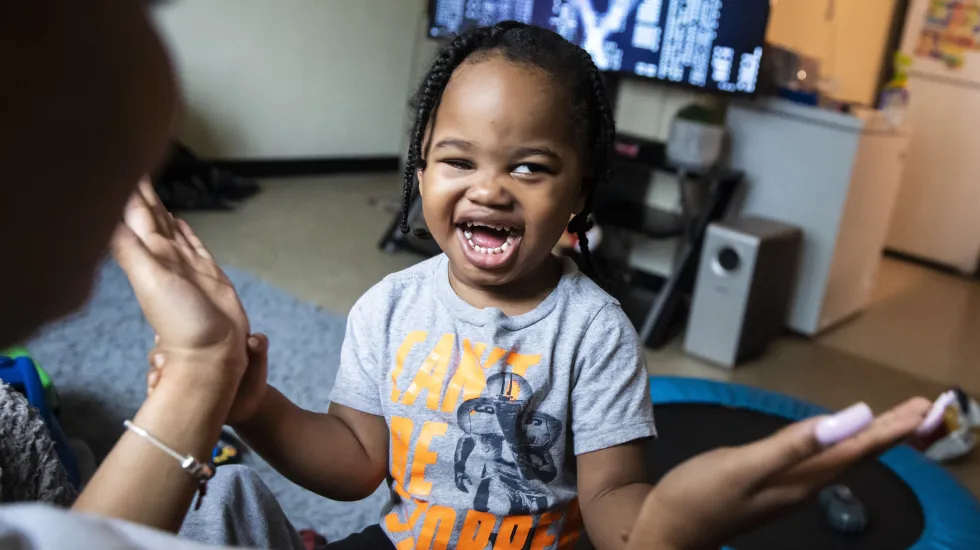
Jalisa Hooks knew she needed to get to Lurie Children’s Hospital right away, but that was all she knew — because the caller hadn’t told her why.
So on one spring day last year, she found herself inching north in DuSable Lake Shore Drive traffic. Smoke began pouring out from under the hood of her sister’s car.
Hooks, her sister and mother got out and started walking on the shoulder. Hooks was nine months pregnant with her second child.
At the time, Hooks had no idea why traffic was backed up: Her 22-month-old son, Kayden Swann, had been shot in the head during an argument that lurched into gunfire on the Drive. He was now fighting for his life at Lurie.
“I’m like, ‘What’s wrong with today?’” Hooks, 21, remembers thinking. That was April 6, almost a year ago.
Hooks laughs about it — a jarring reaction, given what she and Kayden, her oldest son, have endured. It’s Hooks’ way of handling the almost unspeakable; that, and she has reason for hope now.
After a month in the hospital — some of it in a chemically induced coma and on a ventilator — and another month of rehab, Kayden is shoving toilet paper rolls into the toilet, flipping the oven knob to broil, crushing Oreo cookies underfoot — and generally doing what 2-year-olds do best.
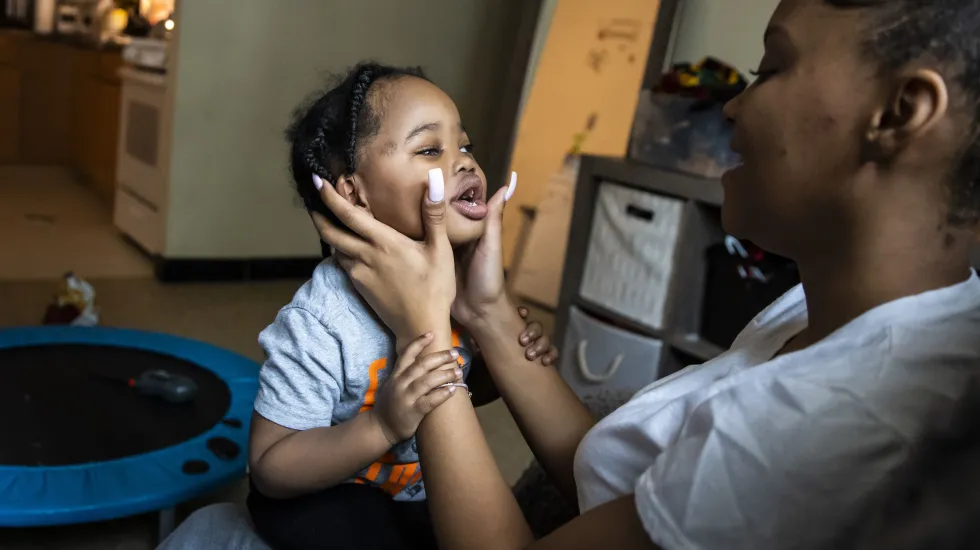
On a recent visit to the family’s South Side apartment, Kayden leaped from his mini-trampoline onto the back of a rocking horse. He jumped into a stranger’s lap, jabbed a finger and said, “Eyes!”
It’s then, if you look closely, that you notice a smudge of darker skin near Kayden’s right eye and a similar mark on the opposite side of his head. Kayden’s right eye narrows so that the white part is no longer visible. The bullet passed through one side of the boy’s head and out the other, severing the right eye’s optic nerve. Doctors hope that, with time or surgery, he’ll regain some of his vision.
“To me, that’s really fortunate because there are a lot of other structures in such a small brain that the bullet can injure,” said Dr. Marcelo Malakooti, Lurie’s medical director for the pediatric intensive care unit.
Kayden arrived at Lurie in “extremely critical condition,” Malakooti said.
“The good news is that children are very resilient. Their brains, their bodies and their cells are constantly turning over, renewing and they tend to recover from serious injuries a little bit better than [middle-aged] people,” Malakooti said.
Hooks and her mother, Donna Rogers, rarely left Kayden’s hospital bedside. Hooks finally went home, when she began feeling unwell, she said. Turns out, she was about to give birth to her second child, she said.
She doesn’t have much to say about what might have led to the shooting. She says she still doesn’t know the full story — and doesn’t want to.
“I really don’t know what would make him shoot my baby. So I just want to stay out of it,” she said, her voice becoming quieter.
Then she jokes: “Something like this, we need [talk show host] Steve Wilkos. We need to go on there to try to figure out what happened. … That’s the only way you’ll find out the truth.”
Cook County prosecutors and Chicago police say gunfire erupted during a dispute over one car not letting another into a lane of traffic northbound on the Drive near Soldier Field.
Kayden, his paternal grandmother and her boyfriend were in one car; Deandre Binion and his pregnant girlfriend were in the other. Binion allegedly fired up to 10 rounds at the car in which Kayden was a passenger. Shortly before 25-year-old Binion allegedly pulled the trigger, Jushawn Brown — the grandmother’s boyfriend — told Binion, to “back off” as Binion drove his rented SUV close to the bumper of Brown’s Lincoln sedan. Brown “leaned out of the seat and told [Binion] to back off and that he had a child in the car,” prosecutors said during Binion’s initial bond hearing.
That’s what prompted Judge Mary Marubio to order Binion held without bail on the attempted murder and aggravated battery with a firearm charges.
But in December, Binion’s attorney, Mike Krejci, asked for a bond review and argued in court that Binion hadn’t fired first, noting that Kayden’s grandma had been recorded on police body camera video saying her boyfriend had fired the first shot. Prosecutors disputed that and noted that Binion allegedly continued firing even after the victims were driving away.
Nevertheless, Judge Michael Hood set bail at $500,000 and ordered electronic home monitoring. Binion posted 10% of that and was released. Reached in his office, Hood referred questions to Cook County Chief Judge Tim Evans’ media contact, who said judges aren’t allowed to comment on pending cases.
“In our belief, the judge ruled appropriately,” Krejci said, declining to say more. “He had no criminal background.”
Tandra Simonton, a spokeswoman for Cook County State’s Attorney Kim Foxx, said Hood reduced the bond “over the state’s objection.”
Hooks wants nothing to do with any possible trial for Binion. She does say he should still be locked up.
Now, her focus is only her children.
“They told me [Kayden] was going to have brain damage, but there’s nothing wrong with him,” she said as the little boy bounced on her lap. “He remembers every day from before it happened, and he’s still learning new stuff that he ain’t supposed to be learning.”
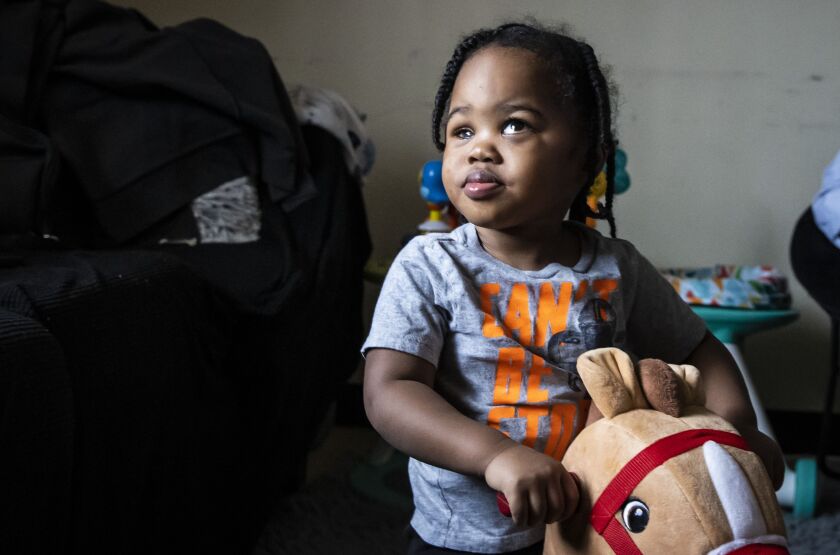
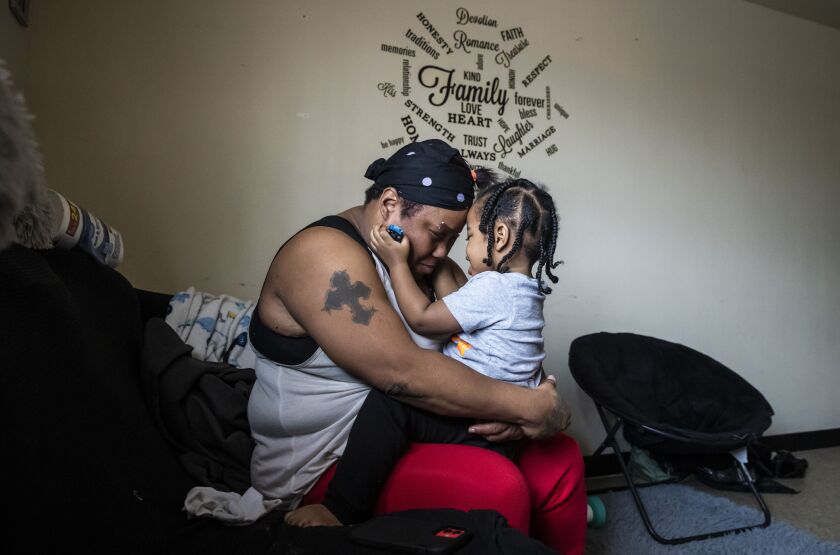

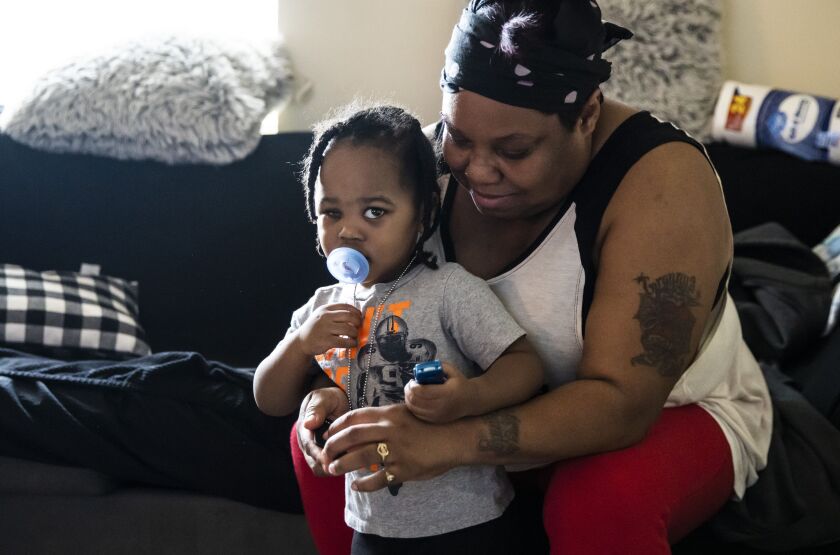
Contributing: David Struett







